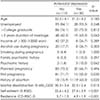1. American Psychiatry Association. Diagnostic and statistical manual of mental disorders, 5th edition: DSM-5. Arlington, VA: American Psychaitry Association;2013. p. 186–187.
2. O'Hara MW, McCabe JE. Postpartum depression: current status and future directions. Annu Rev Clin Psychol. 2013; 9:379–407.
3. Youn JH, Jeong IS. [Predictors of postpartum depression: prospective cohort study]. J Korean Acad Nurs. 2013; 43:225–235.

4. Oddo-Sommerfeld S, Hain S, Louwen F, Schermelleh-Engel K. Longitudinal effects of dysfunctional perfectionism and avoidant personality style on postpartum mental disorders: pathways through antepartum depression and anxiety. J Affect Disord. 2016; 191:280–288.

5. Lee AM, Lam SK, Sze Mun, Chong CSY, Chui HW, Fong DYT. Prevalence, course, and risk factors for antenatal anxiety and depression. Obstet Gynecol. 2007; 110:1102–1112.

6. Spinelli MG. Interpersonal psychotherapy for depressed antepartum women: a pilot study. Am J Psychiatry. 1997; 154:1028–1030.

7. Gavin NI, Gaynes BN, Lohr KN, Meltzer-Brody S, Gartlehner G, Swinson T. Perinatal depression: a systematic review of prevalence and incidence. Obstet Gynecol. 2005; 106:1071–1083.
8. Cho HJ, Choi GY, Lee JJ, Lee IS, Park MI, Na JY, et al. Original reports : a study of predicting postpartum depression and the recovery factor from prepartum depression. Korean J Perinatol. 2004; 15:245–254.
9. Schatz DB, Hsiao MC, Liu CY. Antenatal depression in East Asia: a review of the literature. Psychiatry Investig. 2012; 9:111–118.

10. Field T. Prenatal depression risk factors, developmental effects and interventions: a review. J Pregnancy Child Health. 2017; 4:301.

11. Sheeba B, Nath A, Metgud CS, Krishna M, Venkatesh S, Vindhya J, et al. Prenatal depression and its associated risk factors among pregnant women in Bangalore: a hospital based prevalence study. Front Public Health. 2019; 7:108.

12. Kim SH. Factors associated with maternal attachment of breastfeeding mothers. Child Health Nurs Res. 2019; 25:65–73.

13. Koh M, Ahn S, Kim J, Park S. Pregnant women's antenatal depression and influencing factors. Korean J Women Health Nurs. 2019; 25:112–123.

14. Bonari L, Pinto N, Ahn E, Einarson A, Steiner M, Koren G. Perinatal risks of untreated depression during pregnancy. Can J Psychiatry. 2004; 49:726–735.

15. Hollins K. Consequences of antenatal mental health problems for child health and development. Curr Opin Obstet Gynecol. 2007; 19:568–572.

16. Wolf AW, De Andraca I, Lozoff B. Maternal depression in three Latin American samples. Soc Psychiatry Psychiatr Epidemiol. 2002; 37:169–176.

17. Leigh B, Milgrom J. Risk factors for antenatal depression, postnatal depression and parenting stress. BMC Psychiatry. 2008; 8:24.

18. Lee SY, Lim JY, Hong JP. Policy implications for promoting postpartum mental health. Sejong: Korea Institute for Health and Social Affairs;2017.
19. Ahn YJ. Introduction of pregnancy registry. Pubilc Health Weekly Report, PHWR. 2014; 7:953–957.
20. Kwon M. Antenatal depression and mother-fetal interaction. J Korean Acad Child Health Nurs. 2007; 13:416–426.
21. Kim YK, Hur JW, Kim KH, Oh KS, Shin YC. Clinical application of Korean version of Edinburgh Postnatal Depression Scale. J Korean Neuropsychiatr Assoc. 2008; 47:36–44.
22. Cox JL, Holden JM, Sagovsky R. Detection of postnatal depression. Development of the 10-item Edinburgh Postnatal Depression Scale. Br J Psychiatry. 1987; 150:782–786.
23. Bae H, Choi S, Yu J, Lee J, Choi K. Reliability and validity of the Korean version of the Rosenberg Self-Esteem Scale (K-RSES) in adult. Mood Emot. 2014; 12:43–49.
24. Jon BJ. Self-esteem: a test of its measurability. Yonsei Nonchong. 1974; 11:107–130.
25. Snyder DK. Marital Satisfaction Inventory (MSI): administration booklet. Los Angeles, CA: Western Psychological Services;1979.
26. Kwon JH, Chae G. A validation study of the Korean Marital Satisfaction Inventory 2. Korean J Clin Psychol. 1999; 18:123–139.
27. Jeong HS, Kang I, Namgung E, Im JJ, Jeon Y, Son J, et al. Validation of the Korean version of the Connor-Davidson Resilience Scale-2 in firefighters and rescue workers. Compr Psychiatry. 2015; 59:123–128.

28. Gordon TE, Cardone IA, Kim JJ, Gordon SM, Silver RK. Universal perinatal depression screening in an Academic Medical Center. Obstet Gynecol. 2006; 107:342–347.

29. Alvarado R, Jadresic E, Guajardo V, Rojas G. First validation of a Spanish-translated version of the Edinburgh Postnatal Depression Scale (EPDS) for use in pregnant women. A Chilean study. Arch Womens Ment Health. 2015; 18:607–612.

30. Harris B, Huckle P, Thomas R, Johns S, Fung H. The use of rating scales to identify post-natal depression. Br J Psychiatry. 1989; 154:813–817.

31. Kwon JH. A test of a vulnerability-stress model of prepartum depression. Korean J Clin Psychol. 1996; 15:33–43.
32. Jesse DE, Walcott-McQuigg J, Mariella A, Swanson MS. Risks and protective factors associated with symptoms of depression in low-income African American and Caucasian women during pregnancy. J Midwifery Womens Health. 2005; 50:405–410.

33. Howard LM, Oram S, Galley H, Trevillion K, Feder G. Domestic violence and perinatal mental disorders: a systematic review and metaanalysis. PLoS Med. 2013; 10:e1001452.

34. Pedersen W. Abortion and depression: a population-based longitudinal study of young women. Scand J Public Health. 2008; 36:424–428.

35. Klock SC, Chang G, Hiley A, Hill J. Psychological distress among women with recurrent spontaneous abortion. Psychosomatics. 1997; 38:503–507.

36. Choi SK, Ahn SY, Shin JC, Jang DG. Original articles: a clinical study of depressive symptoms during pregnancy. Korean J Obstet Gynecol. 2009; 52:1102–1108.
37. Ghaedrahmati M, Kazemi A, Kheirabadi G, Ebrahimi A, Bahrami M. Postpartum depression risk factors: a narrative review. J Educ Health Promot. 2017; 6:60.
38. Milgrom J, Gemmill AW, Bilszta JL, Hayes B, Barnett B, Brooks J, et al. Antenatal risk factors for postnatal depression: a large prospective study. J Affect Disord. 2008; 108:147–157.

39. Felice E, Saliba J, Grech V, Cox J. Prevalence rates and psychosocial characteristics associated with depression in pregnancy and postpartum in Maltese women. J Affect Disord. 2004; 82:297–301.

40. Bunevicius R, Kusminskas L, Bunevicius A, Nadisauskiene RJ, Jureniene K, Pop VJ. Psychosocial risk factors for depression during pregnancy. Acta Obstet Gynecol Scand. 2009; 88:599–605.

41. Daley AJ, Macarthur C, Winter H. The role of exercise in treating postpartum depression: a review of the literature. J Midwifery Womens Health. 2007; 52:56–62.






 PDF
PDF ePub
ePub Citation
Citation Print
Print




 XML Download
XML Download